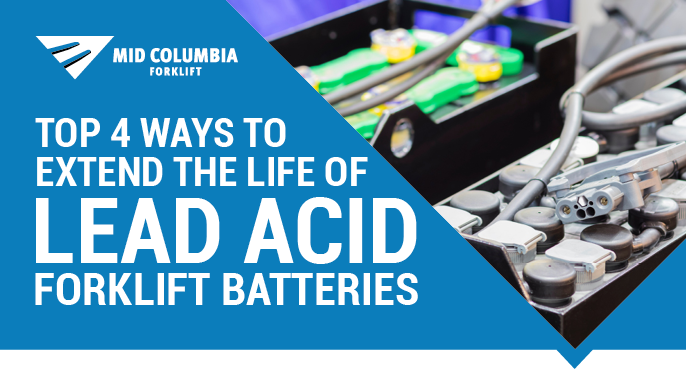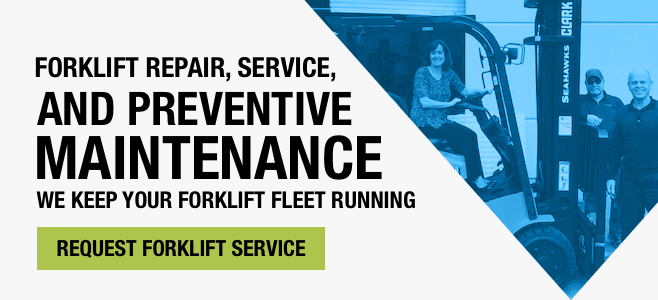Top 4 Ways To Extend the Life of Your Lead Acid Forklift Batteries
by Trey Barber, on December 2, 2022 at 10:33 AM

It's a busy day. You've got a million-and-one things on your to-do list when you glance down at your phone and notice the battery is barely clinging on. How did that happen? You charged it last night, and it's not even noon. The last thing you have time to do is wait for it to charge.
Phone batteries don't last forever, and neither do your forklift batteries. As batteries age, they slowly lose their ability to hold a charge. Of course, you can plug your phone in and keep working. But when your forklift's battery runs dry, you are out of commission until it can recharge. Yet, proper care can extend the life of your forklift batteries. Read on to learn the top 4 ways to keep your forklift batteries working at full capacity.
Lead-Acid Versus Lithium-Ion
Before you can take proper care of your forklift's battery, you need to know what kind of battery it is. Forklift batteries come in two general varieties: lead-acid and lithium-ion.
Lead-Acid Forklift Batteries
Lead-acid batteries are one of the oldest varieties of forklift battery. They're essentially a pair of lead electrodes submerged in a solution of sulfuric acid and water. They are simple to make and, thus, are less expensive than lithium-ion batteries. However, they are also less safe and less efficient than their lithium-ion cousins.
Lithium-Ion Forklift Batteries
Lithium-ion (Li-ion) forklift batteries have undergone several configurations as the technology has developed. Today, most Li-ion batteries use a lithium, iron, and phosphate (LFP) combination. These are safer, more efficient, and more environmentally friendly than lead-acid batteries. But they are also initially more expensive to buy. Though they are less costly to maintain.
Ways To Extend the Life of Your Forklift Batteries
Your forklift batteries work as hard as any other part of your forklift. Likewise, they need a little care to ensure a long and productive life. On average, a forklift battery will last 5 years, working 8 hours a day and 300 days a year. However, without the proper care, that lifespan can shrink to as much as half.
1. Use the Right Kind of Charging for Your Battery
Proper charging is one of the most important aspects of extending your forklift battery life. Each battery only has a certain number of charging cycles in its life span, and proper charging is the only way to get the most out of those cycles.
Lead-acid batteries have about 1,500 charges in their lifespan. Every time you hook that batter up to the charger, you use up one of those charges. It doesn't matter if you are charging a half-full battery or one that's almost empty. Each charge counts as one entire cycle. So, it is important to only charge lead-acid batteries once per day. Any more often, and you could cut the effective life span in half.
Lithium-ion batteries last up to 3,000 charges. And they only use up one of those charge cycles once the batter is charged to 100%. This means they can take advantage of opportunity charging without diminishing the battery's life.
2. Don’t Let Batteries Sit With a Partial Charge
Lead-acid batteries need to be charged immediately after use to preserve their longevity. The internal chemical reaction that allows them to function continues while the battery is in partial charge. Without undergoing recharge, it will slowly destroy the electrodes.
Lithium-ion batteries do not have this problem. As a result, they can be safely left in a partial discharge without any adverse effects.
3. Perform Proper Battery Maintenance
During use, lead-acid batteries will lose water. Without this water, the electrodes will begin to break down. Consequently, it's vital to top off lead-acid batteries with distilled water each week. This will prevent a drop in water level from reducing the battery's life.
Additionally, lead-acid batteries should be cleaned with battery cleaner or warm water once per month. This removes dust and grim that will cause corrosion. Battery corrosion is not only harmful to the battery, but it can also affect your warranty.
Finally, lead-acid batteries need to be equalized regularly. As they work, the acid concentrates near the bottom. If not routinely equalized, the imbalance in electrolytes will decrease battery longevity.
Lithium-ion batteries are much easier to maintain than lead-acid. They don't need to be watered or equalized. And they are far less prone to corrosion.
4. Avoid Extreme Temperatures
Avoid extreme temperatures for all forklift batteries not designed to operate in those conditions. Forklift battery life span can drop by up to 50% if used in temperatures of 92 degrees or higher. Likewise, weather 30 degrees or colder can reduce battery performance by up to 30%. If your forklift operates in these temperatures, invest in a battery designed for the extremes.
Forklift Battery and Battery Charger Repair
Even with proper maintenance, forklift batteries can break down. But replacing a battery is expensive. Batteries can account for 30% of the total cost of the forklift. So, when your battery loses some of its punch, forklift battery repair is often the most cost-effective option.
But batteries are one part of the power equation. Even the best batteries are useless without a functioning charger. Therefore, keeping your chargers in top shape is critical to keep your forklifts operating. As such, it is just as important to schedule preventative maintenance for your chargers as for your forklifts.
Mid-Columbia Forklift has the expertise to keep your electric fleet running at top performance. To learn more about their maintenance and repair plans, reach out to an expert online or to one of our dealerships by phone:
Auburn 253-854-5438
Pasco 509-547-7413
Wenatchee 509-663-9009
Yakima 509-457-5137
Further Reading
5 Reasons Why Li-ion Forklift Batteries Are Better than Lead-Acid
How to Switch from IC to Electric Forklifts to Go Green and Save Money
The Complete Guide To Getting and Maintaining a Li-ion Forklift Fleet





